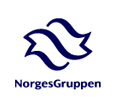NorgesGruppen
NorgesGruppen ASA is a Norwegian grocery wholesaling group which also runs various retail outlets. With a 43,2 % market share[1] in 2018, NorgesGruppen was the largest player in the Norwegian grocery retail market.[2] The business dates back to 1866 when the wholesale activity started up in the name of Joh. Johannson.
 | |
| Private ASA | |
| Industry | Grocery wholesale |
| Founded | 1994 |
| Headquarters | Oslo, Norway |
Area served | Norway |
Key people | Runar Hollevik (CEO) Knut Hartvig Johannson (board chairman) |
| Revenue | |
Number of employees | 28,000 (2018) (40 000 associated employees) |
| Website | www.norgesgruppen.no |
Wholesale
ASKO is the wholesale branch of NorgesGruppen. The wholesale business is responsible for the total flow of goods from manufacturer to the market segments in grocery retail, industrial household and convenient stores [1] and consists of several regional companies, supplying groceries to NorgesGruppen’s stores, in addition to a smaller number of stores outside of NorgesGruppen. ASKO also supplies groceries to Horeca (hotels, restaurants and caterer) customers in Norway. ASKO distributes a portfolio of 25,000 products and serves 14,000 clients from 13 warehouses, covering all parts of Norway.
Facts retail
- More than 1,800 grocery stores in 89 per cent of Norway’s municipalities
- 900 points of sale as retail convenience goods stores
- 1,000 independent retailers
- 41,000 employees representing 70 different nationalities
- 1,200 business partners NorgesGruppen’s strong chain concepts (Kiwi, Meny, Spar, Joker) cover the full range from discount, via district stores, to supermarkets.
Brands
NorgesGruppen owns various private labels, developed and managed by its subsidiary Unil AS. The private labels include:
- First Price
- Eldorado
- Jacobs utvalgte
- Fiskemannen
- Folkets
- Fersk & ferdig
- Unik
- Fauna
- Seidel
Sources
- "Annual review 2012, S.2" (PDF). NorgesGruppen. 2013-10-11.
- "Retailing in Norway - Market Research Report - Euromonitor". www.euromonitor.com.